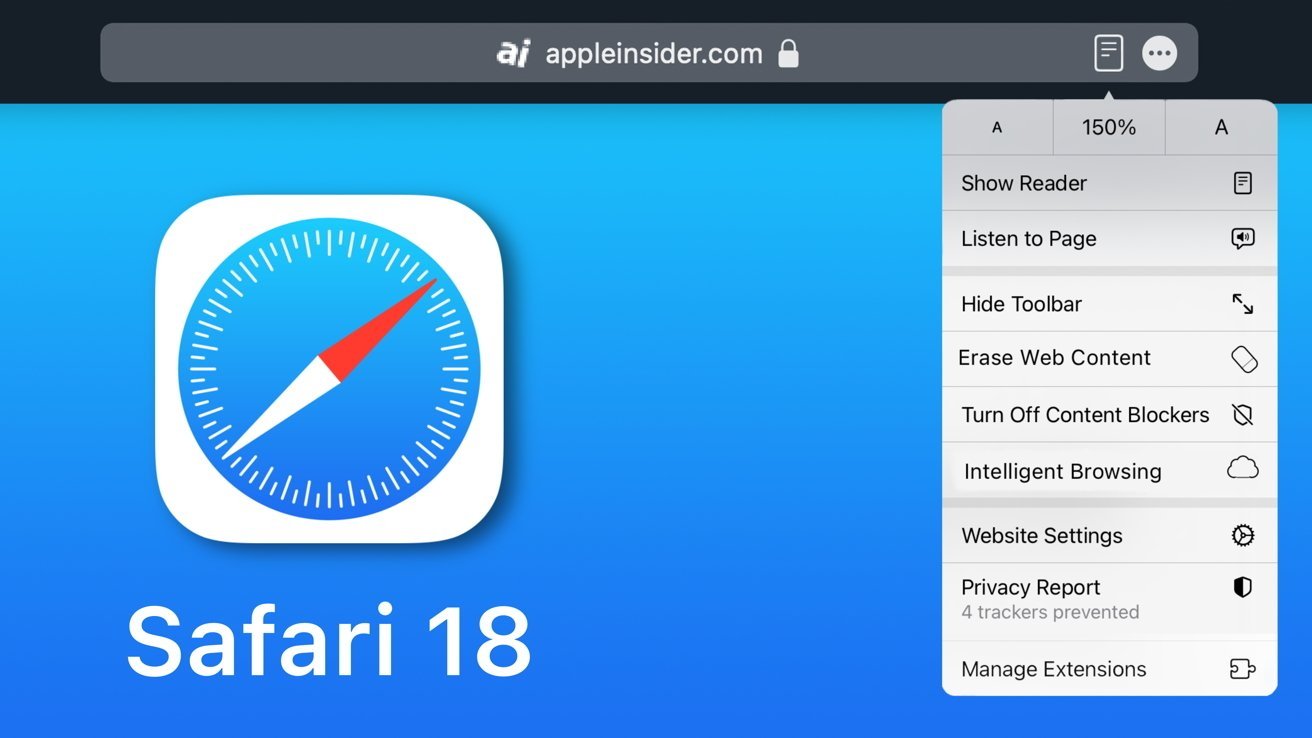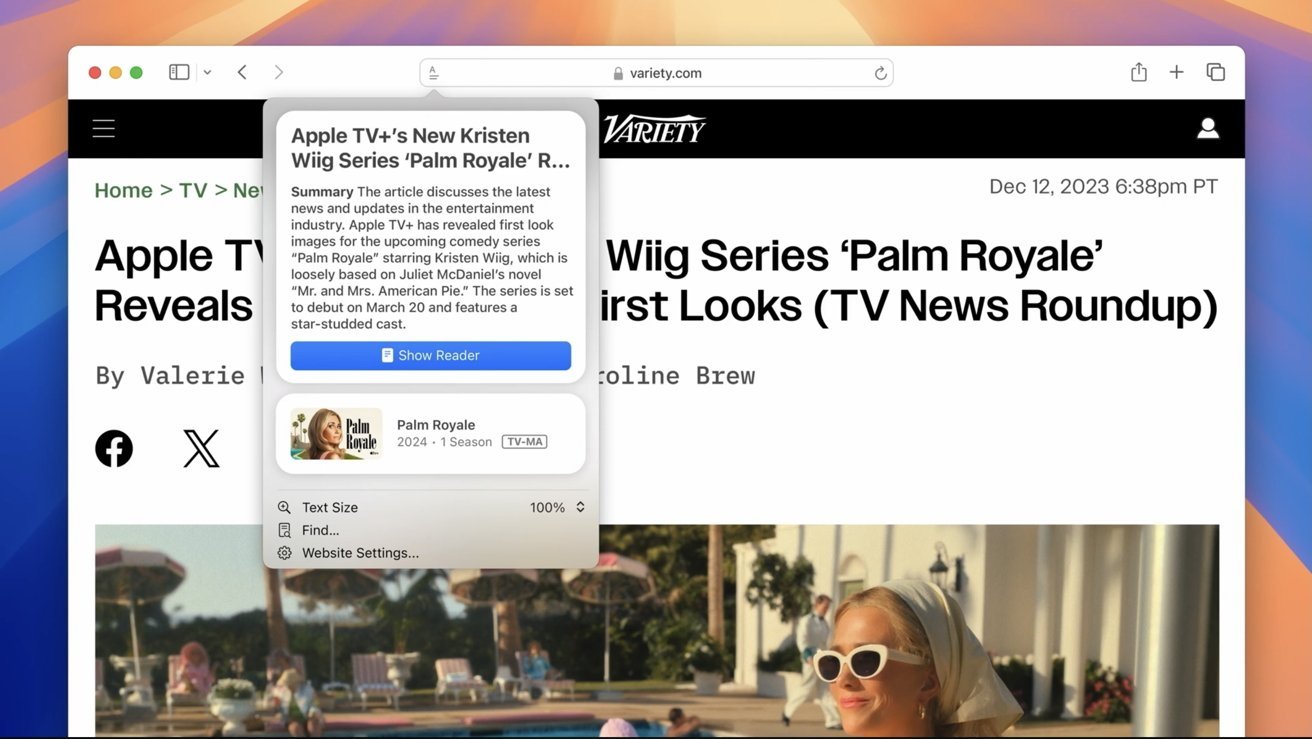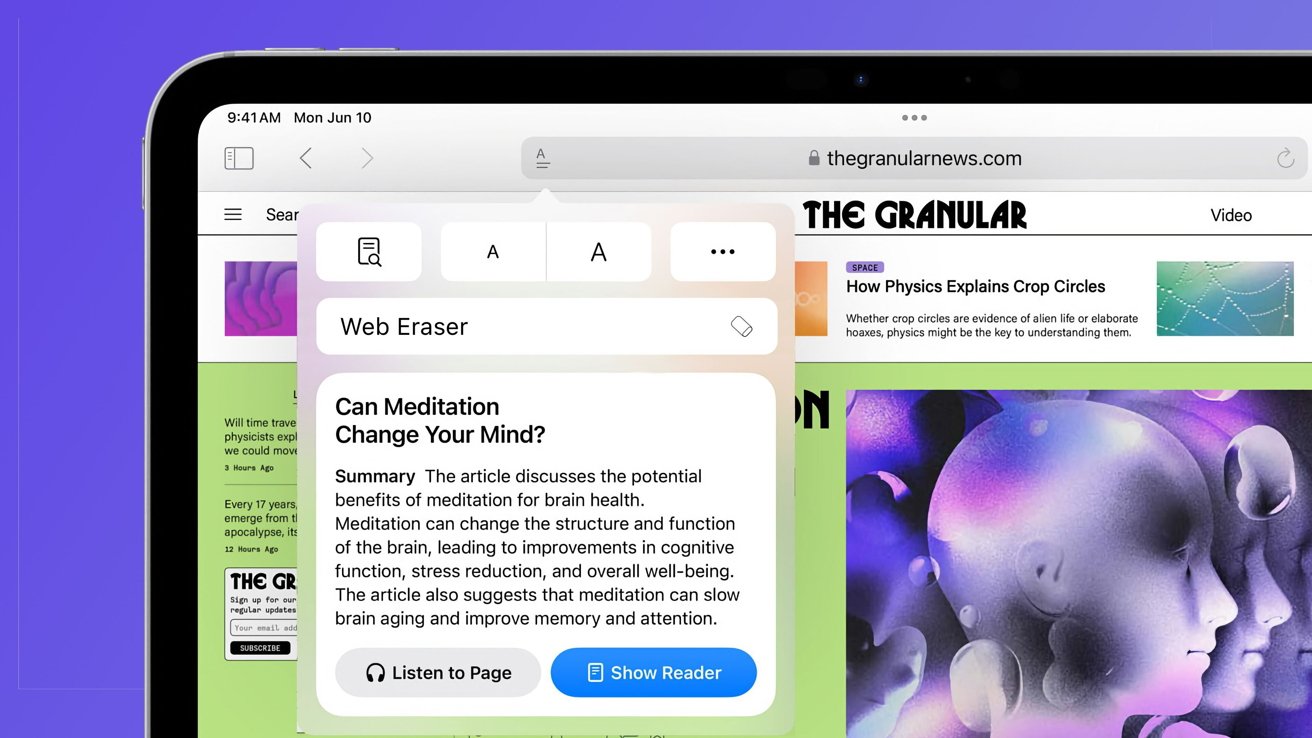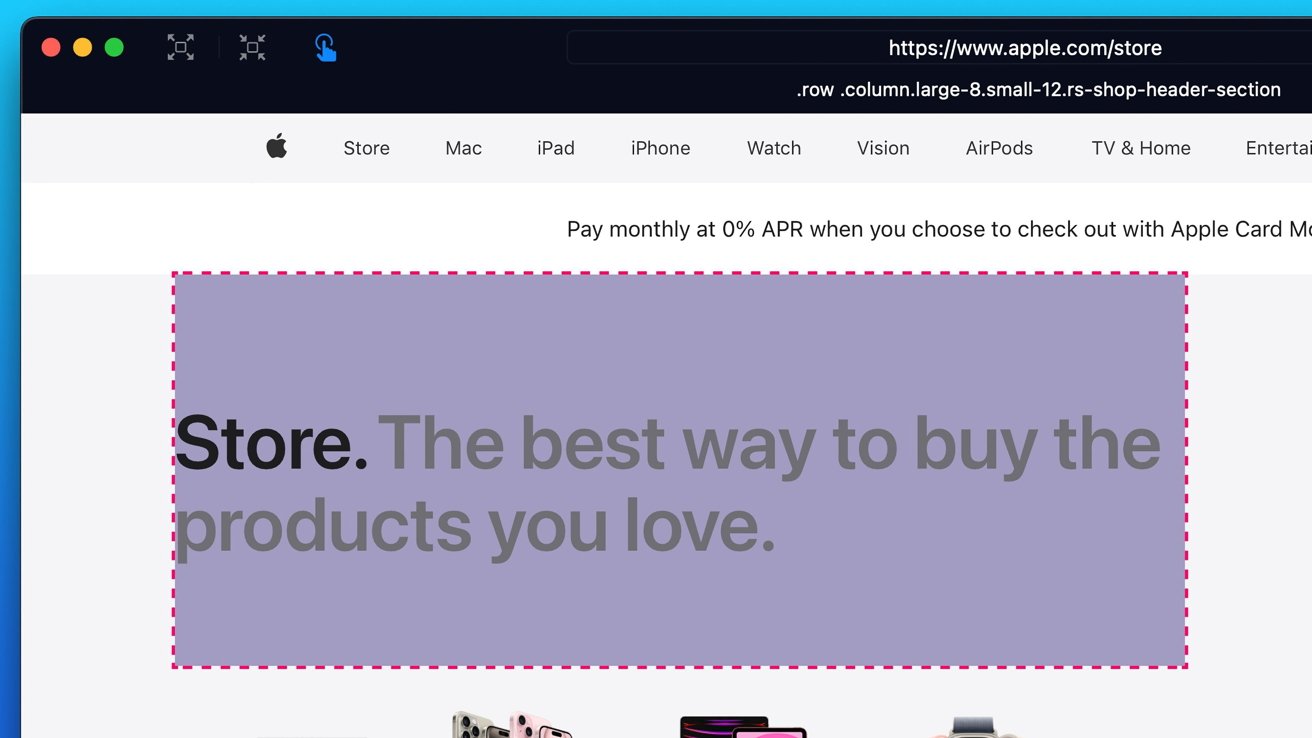What happened to Safari Web Eraser -- the controversy, and what it looked like
One of Apple's upgrades for Safari -- the Web Eraser content blocker -- never became available to the public, even though it was complete and fully functional. Here's what happened along the way, what it looked like, and how it worked.

Web Eraser was a built-in content blocker in Safari 18
In April, AppleInsider revealed exclusive information about new features within the Safari 18 web browser, which was still in development at the time. In our initial report, we discussed two major features Apple created for the latest iteration of Safari -- Intelligent Search and Web Eraser.
Intelligent Search is a feature that provides users with key information about the page currently on-screen, along with an AI-generated summary of its contents. While this enhancement made it into the final release under the name Highlights, it appears as though Web Eraser has been removed in its entirety.
Web Eraser was Apple's built-in content-blocker, found in pre-release development builds of Safari 18. In speaking with people familiar with the matter, we learned that Web Eraser allowed users to select any page element on-screen, and "erase" it.
The erasure was persistent, meaning that internal versions of Safari remembered the changes made to a webpage, and reminded users of them whenever the page was visited. We were told that Web Eraser enabled the removal of virtually anything on-screen, from distracting banner ads to articles or even entire page sections.
So, why did Apple remove a Safari feature that was fully functional?
The answer to that question is likely two-fold -- to avoid controversy and to make leaked information appear inaccurate or incorrect.
After AppleInsider's original article on the subject was published, it caught the attention of major industry associations in the publishing and advertising sector. Following our reveal of the feature, mainstream media websites The Financial Times and Business Insider reported that the UK's News Media Association and a group of French publishers had both sent complaints to Apple about Web Eraser in May.
The controversy caused by Web Eraser's reveal
The News Media Association's letter stated that Web Eraser was akin to an ad blocker, which they considered to be "a blunt instrument which frustrates the ability of content creators to sustainably fund their work." The letter also added that Web Eraser "could lead to consumers missing important information which would otherwise have been very useful to them."
Advertisers and publishers have expressed serious concerns over Web Eraser, similar to their complaints over Apple's 2021 App Tracking Transparency feature
In an interview with Press Gazette, News Media Association chief Owen Meredith said that they were "not aware of any publisher who's had any conversations with Apple or any engagement between Apple and publishers on this."
Meredith went on to criticize Apple for developing "a tool that has potentially significant consequences on how publishers' content is used or displayed on Apple devices" all without any involvement from publishers. The NMA chief described it as an "extremely concerning way for a tech giant to go about doing business."
For reference, the UK's News Media Association represents over 900 different national, regional, and local titles, including The Times, The Daily Mail, The Guardian, and The Daily Telegraph. Safari accounts for around a third of the internet browser market in the United Kingdom.
Business Insider later reported on May 29 that a group of French publishing associations also voiced their concerns by sending a signed letter to Tim Cook. The group included the online publishing association Geste, press trade group APIG, advertising agency association SRI, digital marketing body Alliance Digitale, media-agency trade body UDECAM, as well as the advertiser association Union des Marques.
The group, which collectively represents around 800 advertisers, ad-tech companies, agencies, and publishers in France, said in the letter that Web Eraser could threaten 100,000 jobs in France that depend on online ads.

The UK's News Media Association is one of the organizations that sent out letters against Apple's planned Web Eraser feature - Image courtesy of NMA Ltd.
Their letter also said that Web Eraser "raises numerous questions, particularly concerning legal and editorial responsibilities that Apple still has not responded to, " and that the feature would jeopardize ad sales "in an already troubled period."
"[It would] restrict citizens' access to free, diverse and quality information," the letter goes on to say, adding that Web Eraser could have "significant consequences to pluralism, content accessibility, and democratic vitality."
According to the group's estimates, Safari accounts for a quarter of all web traffic in France, while the number goes up to 90% for mobile devices.
The French publishers' concerns were so serious that they simultaneously sent out copies of their letter to government officials. This included the French minister of culture, the head of the French Competition Authority, and Thierry Breton, the European Commissioner for internal markets.
All of this happened despite the fact that Web Eraser was never officially announced, nor was it ever acknowledged by Apple in any shape or form.
The feature had somehow managed to generate a massive amount of controversy, solely from our report. Even though it was nowhere to be seen.
While Apple likely sought to avoid controversy and complaints from publishing associations, the company also likely had another reason for abandoning its Web Eraser feature.
Other possible reasons for Web Eraser's removal
Apple has been known to rename in-development features and devices ahead of release, seemingly for no reason other than to paint leaked reports as wrong or inaccurate in some way.
A notable example of this occurred in 2023, when Apple released the first developer betas of its new operating system for the Apple Vision Pro headset. Widely expected to make its debut under the name xrOS, the company instead announced "visionOS."

The Highlights feature in Safari 18 was originally known as Intelligent Browsing
Even then, there were indications of a rushed rebrand. Apple's instructional videos and code from the operating systems contained clear mentions of the name xrOS.
Apple renamed several operating system features ahead of launch. To be more specific, the company renamed its Adaptive Voice Shortcuts accessibility feature to Vocal Shortcuts.
As mentioned earlier, Intelligent Search received the name Highlights, while Generative Playground was changed to "Image Playground." The name "Generative Playground" still appears as the application title in the recently released developer betas of Apple's operating systems.
AppleInsider has independently verified the name changes of the software features described above. We have done so through people familiar with Apple's pre-release operating systems.
By removing Web Eraser in its entirety and leaving no trace of it, Apple could have easily killed two birds with one stone. Publishers and advertisers would be content with the feature's absence, and information on the ad-blocker would be regarded as incorrect.
Another possibility is that Web Eraser was an internal-only tool meant exclusively for use by Apple's software engineers. This theory does not necessarily explain the relatively polished UI the feature had though, as there would be no reason to put effort into the design of an internal application.
What did Web Eraser look like and how did it work?
Speaking to people familiar with the matter, AppleInsider has received detailed information about the overall design and function of Web Eraser in pre-release versions of Safari 18.

The option to toggle Web Eraser was located right above summaries from Safari's new Highlights feature
In particular, we were told that Web Eraser was accessible from the same UI element that currently displays "Highlights" in the publicly available betas of Apple's operating systems. The new UI element had a more consistent look across iPadOS and macOS, as the company initially sought to provide a unified experience on both devices.
On the Mac, the new UI element originally featured rounded buttons, with the same layout currently found on iPadOS 18. The option to toggle Web Eraser was located above the page summary or "Highlights" in current developer betas.
AppleInsider was told that activating Web Eraser would make the URL bar in Safari turn gray and that users would then be able to select specific page elements they'd like to erase.

Web Eraser had a selection interface similar to the popular third-party app 1Blocker
The UI reportedly resembled the third-party application 1Blocker, which has a similar visual editor feature that can hide elements of a webpage. It's possible that Apple wanted to introduce a privacy-focused content blocker that would rival third-party products such as 1Blocker.
Upon deleting their desired page elements and sections, such as banner ads, users could continue browsing as they would normally. As mentioned earlier, the erasure was persistent.
Practically, this means that Safari would automatically hide unwanted elements every time the user visited a specific webpage.
The browser would still remind users of hidden elements, however, giving users the option to undo changes made by accident. The amount of information we were able to obtain overwhelmingly indicates that Web Eraser was a functional OS feature, despite never being released.
While Web Eraser apparently didn't make the cut, Apple introduced a whole host of other system features. At the company's annual WWDC on Monday, the company previewed a new AI-powered image generation tool called Image Playground, as well as new features for Notes, and improvements to the Mail app.
Read on AppleInsider

Comments
This one is not difficult. There are many of us that have issues whether it be ADHD, Anxiety or others that can be
inflamed by some of the bad advertising. You cannot claim your desire is to make the better and then put profits
over mental health. You (Apple) have tried in the past (blocking auto play videos) and they found workarounds. Just
Like they'll find workarounds for "Web Eraser" technologies and return to their guerilla style ads of annoyance.
This is a conversation that needs to happen.
Just leave the ad… but erase all tracking code from the page!
Like in all ‘paper’ newspapers… I see the ad… but it does not steal my info!
On the other hand I do not see much consideration for the needs and desires of those who do the browsing. Consumers get the shaft. Again!
But whilst they do, they’ll be ad-blocked and I have zero sympathy.
Getting an ad for a product after you look it up is probably even more effective because you have just signaled some interest in the product and I'd bet that additional advertising nudge gets a quite a few people to go ahead and purchase it. Again, the practice wouldn't continue if it wasn't successful.
Related: Google regularly offers me "simplified pages" in Google News, meaning all ads removed from the original web page, but with the link in place in case someone might think they want to see what the ad was. That would be nobody.